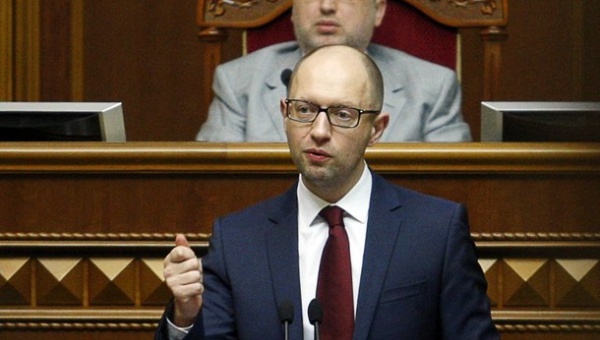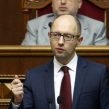
Ukrainian Ruling Coalition Breaks up, Early Elections Loom
Publication: Eurasia Daily Monitor Volume: 11 Issue: 137
By:

The majority coalition in Ukraine’s unicameral parliament has formally dissolved. This should make it possible for President Petro Poroshenko, who was himself elected (on May 25) in early elections, to call early parliamentary elections. His party may win, according to opinion polls, while the party that dominates the government now, Fatherland, is likely to lose. Prime Minister Arseniy Yatsenyuk, who is from Fatherland, has announced his resignation, but his Cabinet is likely to continue to govern until the elections.
On July 24, Speaker Oleksandr Turchynov announced that the ruling “European Choice” coalition broke up as the liberal party Ukrainian Democratic Alliance for Reform (UDAR) and the far-right party Freedom quit, leaving Fatherland alone (Channel 5, July 24). According to the Ukrainian constitution, the president dissolves parliament and calls early elections if no coalition is formed after one month. Two months will most probably be allotted for an election campaign, so October 26 may be election day. This is in line with the plans Poroshenko shared with people’s deputies earlier this month (lb.ua, July 2).
Early elections are quite likely because it is hard to imagine a new coalition forming to include the second largest faction in parliament, the Party of Regions (PRU), along with any of the three Maidan revolution winners: Fatherland, UDAR or Freedom. Fatherland has controlled the government since last winter’s Maidan mass street demonstrations. The PRU, whose former leader, deposed president Viktor Yanukovych, fled Ukraine to Russia in February in the face of growing public unrest, have been the Maidan’s main antagonists. Yatsenyuk has already ruled out a coalition with the PRU (112.ua, July 24).
The break-up of the European Choice coalition has long been expected, not because of antagonisms inside it, but because of the consensus reached during and after the Maidan that Ukraine should hold both early presidential and early parliamentary elections (Podrobnosti, December 17, 2013; president.gov.ua, June 17). Last month, Poroshenko urged parliament to dissolve itself, saying that the nation wanted early elections (president.gov.ua, June 18). Under the current constitution, the easiest method to trigger early parliamentary elections is through the break-up of the ruling coalition.
Nevertheless, it seems as if the breakup of the coalition was totally unexpected for Fatherland. Early on July 24, Fatherland’s parliamentary faction leader, Serhy Sobolev, assured journalists that European Choice was as strong as never before (kp.ua, July 24). Prime Minister Yatsenyuk emotionally reacted to the news of the breakup. He announced his own resignation, predicting “dramatic consequences for the country,” and accusing his former coalition partners of playing into the hands of Russia, which is waging a proxy war in eastern Ukraine. At the same time, however, he said that “most people want early elections and we want them too” (112.ua, July 24). President Poroshenko’s reaction was ostentatiously calm. In an official letter to Parliamentary Speaker Turchynov, he said there was no need for Yatsenyuk’s Cabinet to resign, and urged parliament to vote confidence in it (president.gov.ua, July 24).
The Yatsenyuk government is thus likely to carry on in an interim capacity until after the elections. This may be politically damaging to Fatherland, as it will likely be blamed by rivals during the upcoming election campaign for the dismal state of the economy and the austerity measures planned in order to qualify for more international assistance, without which Ukraine will face fiscal default. Opinion polls show that Fatherland is unlikely to repeat the success it enjoyed in the October 2012 elections, after which it held the second largest number of seats in the national legislature.
By contrast, Poroshenko is likely to come out on top. The same polls show that his affiliates may win the upcoming early elections. This should allow his team to form the next Cabinet, after which Poroshenko may become no less powerful than his predecessor—Viktor Yanukovych—after the 2010 presidential election. The restoration by parliament in February of the 2004 constitution weakened the president vis-à-vis the legislature, as the president no longer appoints the Cabinet. But Poroshenko would be able to overcome this weakness if his people controlled the next parliament. In this case, he would be able to shape, via a prime minister from his team, the economic policies of the government, in addition to foreign and security matters over which he already has political control.
The most recent opinion polls, conducted by the Rating and Kyiv International Institute of Sociology (KIIS), show that Poroshenko’s tiny party, Solidarity, capitalizing on Poroshenko’s personal popularity would contest victory in early elections with the populist Radical Party of maverick people’s deputy Oleg Lyashko. Fatherland is likely to finish only third. It is interesting that the PRU and the Communists, whose coalition dominated parliament before February, may not make it into the next parliament at all (Rating Group, July 23; KIIS, July 25).
UDAR and Freedom are also likely to benefit from early elections. UDAR deputies are Poroshenko’s allies. Meanwhile, the far right Freedom Party, which lost several posts in the government during the last several months, was apparently not satisfied with being a junior partner in the Cabinet. Freedom may return to the radical tactics and public scandals that helped them in the run up to the 2012 elections. Most recently, Freedom members physically assaulted Communist leader Petro Symonenko in parliament (YouTube, July 23).
Radical Party leader Lyashko’s popularity shows that his tactics can be successful at a time when people no longer trust the country’s traditional parties. Lyashko has been a hero of TV talk shows and YouTube, posing with pitchforks, interrogating visibly scared semi-nude men presented as pro-Russian separatists, and destroying illegal gambling machines. Thus, if pollsters’ predictions come true, the party of the president and the party of an eccentric will be the main players in Ukraine’s next parliament.




